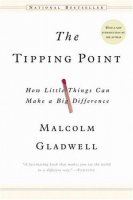 The Tipping Point: How Little Things Can Make a Big Difference by Malcolm Gladwell (Little, Brown, and Company, 2000)
The Tipping Point: How Little Things Can Make a Big Difference by Malcolm Gladwell (Little, Brown, and Company, 2000)
I’ve enjoyed some of Malcolm Gladwell’s other books (Blink, and Outliers), and heard a lot about The Tipping Point, so I expected to like this one better than I did. Certainly the story of how New York City cleaned up its subways and lowered its crime rate is encouraging, and well worth the whole book. Mostly I found it terribly depressing, however. As with the Heaths’ Switch and Made to Stick, I really don’t like learning that so many people in positions of trust are using every trick in the book and then some to manipulate us. Worse, these authors seem less concerned with arming the public against such efforts and more with teaching the tricks to those with “good” motives. But I say, if it’s wrong to manipulate a child to beg his parents for a toy, it’s still wrong to manipulate him to learn the alphabet. And what you learn about Sesame Street and Blue’s Clues from Tipping Point is not going to make you happy about plunking your child in front of the television, for all Gladwell’s approbations.
Even more depressing is the book’s description of fashion, style, what’s “cool” and how it gets that way. By contrast, Calvin’s views on Total Depravity are light and optimisitic.
Worst of all is the section on teen smoking, and other places where Gladwell reveals just how low his expectations are of teens, and how little he thinks parents can influence their children. It’s peers that matter, and if you move into a bad neighborhood, or adopt troubled children, expecting that your family strength, love, and high values will protect your children from the negative influences of their environment, you are tragically mistaken. A child is much better off in a bad family in a good neighborhood than the other way around. It’s normal, and even right, for teens to admire troublemakers, reject anything suggested by an adult, and seek out stupid, life-threatening, risks. There may be something to what he says—certainly no one should enter naïvely into a dangerous ministry—but such a hopeless, dystopian view is more than I can take, at least in my current fighting-the-remnants-of-the-flu state. For a reality check, I stop and look at our wonderful nephews, and remember my own life, where it was God’s grace through my family and nothing else that saved me from getting into a lot of trouble in the 1960’s.
Depressing as much of it may be, The Tipping Point does have some interesting ideas. One section I particularly enjoyed was “The Law of the Few,” in which Gladwell explains the unexpectedly great influence held by a few people, and not because they are rich or obviously powerful. Those he calls Connectors, for example, are far above average in the number and variety of people they know. They have mastered the art of the “weak connection,” a relation greater than mere acquaintance but far less than true friendship, and maintain this connection with a long list of folks from elementary school friends to college buddies, from fellow summer campers to people met on an airplane flight, from work colleagues to the people who mow their lawns. These “weak” connections are actually very powerful, because breakthroughs in our lives often come, not from our own circle of friends, but from those whose knowledge and resources are not so similar to our own.
The Tipping Point was written in 2000; I’d love to see an update, because with all his analysis of connectedness, information, and influence, leaving out social media and the Internet is a glaring, even incomprehensible, omission in 2013.


